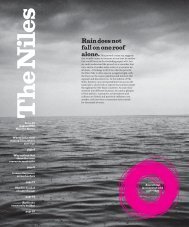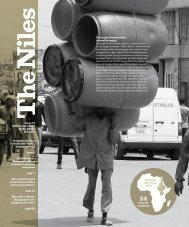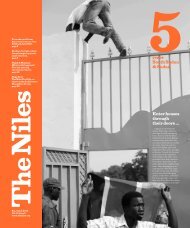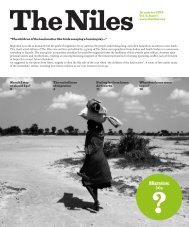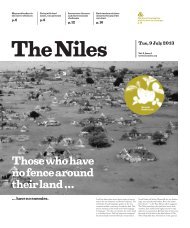When deeds speak, words are nothing
Speaking about sustainable development is easy. Acting sustainably is another matter. And now the evidence is unequivocal: Mankind’s impact on nature is causing the climate to change rapidly and drastically, threatening the environment and the very resources we need to survive. Aware that humanity is careening close to the edge, The Niles correspondents set out to explore where and how people in the Nile Basin region rethink. So much of their findings for now: We are an endlessly innovative species. Cooperation is our superpower. When deeds speak, words are nothing.
Speaking about sustainable development is easy. Acting sustainably is another matter. And now the evidence is unequivocal: Mankind’s impact on nature is causing the climate to change rapidly and drastically, threatening the environment and the very resources we need to survive. Aware that humanity is careening close to the edge, The Niles correspondents set out to explore where and how people in the Nile Basin region rethink. So much of their findings for now: We are an endlessly innovative species. Cooperation is our superpower. When deeds speak, words are nothing.
Create successful ePaper yourself
Turn your PDF publications into a flip-book with our unique Google optimized e-Paper software.
re<think
the way
we live
and work
Water hostilities
Climate change raises tensions over
food, water and other resources
among a growing population in South
Western Uganda.
Henry Lutaaya
Kampala, Uganda
“The volume
of water in the
Mpanga River
used to be much
higher.”
Erosion at the Mpanga River.
Photo: The Niles / Henry
Lutaaya
26
In the South Western Uganda region surrounding
Fort Portal city, relations have become
strained between three groups of people that
use the Mpanga River for different purposes
such as irrigation, domestic use and hydropower
generation. The tensions have arisen
even among people who consider themselves
brothers and sisters.
The operators of the Mpanga Hydroelectric
Power Station, located on the Mpanga in Kamwenge
district just before it flows into Lake
George, say power output has recently fallen
from the dam’s capacity output of 18 megawatts
to as low as three megawatts during the dry
spell and only increase during the wet season.
The dam’s operators have particularly
accused farmers and stone and sand miners
of degrading the river basin and its catchment,
reducing the volume of water and hence
hydropower generated.
Charles Mugisha, the Manager of Mpanga
Hydro Power, told Uganda’s Daily Monitor
newspaper a few months ago that the Rwengaju
Irrigation Project was to blame for the fall
in water volume reaching the dam, especially
during the dry season.
On the other hand, in Fort Portal city,
the Mpanga has come under increased water
pressure for domestic and industrial use
by the national water utility to meet the city’s
growing demand for water.
Residents have been complaining of declining
volume and quality of the water in the
river to the extent that the water utility is sometimes
forced to switch off the water treatment
plant due to the muddy nature of the water.
Some blame has been directed at the government-sponsored
Rwengaju model irrigation
village located upstream of the Mpanga. But
beneficiaries of the irrigation project deny their
activities are harming the river.
Engineer David Baguma, the Chairman
of the Water Users Association in Rwengaju
Irrigation Scheme, a UGX 27 billion (USD 7.6
million) government-funded model irrigation
project, denies that irrigation activities in the
scheme are having an adverse effect on the
volume and quality of water that goes through
Fort Portal and eventually to the Mpanga
Hydroelectric Power Station.
He told The Niles: “As far as we are concerned,
our water comes from Karangura, which is far
away from the dam. We do not have an impact
on water quality, nor are we affected by scarcity.”
The Uganda government established the
irrigation scheme after the National Environment
Management Authority (NEMA) approved
its Environmental and Social Impact Assessment
survey.
But some observers have questioned the
decision to establish the irrigation scheme given
Fort Portal’s rapidly rising demand for water
and the hydropower dam downstream.
Richard Rwabuhinja, the Chairman of
Kabarole District, who doubles as the Chairman
of the River Mpanga Catchment Management
Committee, that was established with guidance
from the Ministry of Water and Environment,
says the irrigation scheme and the hydropower
dam were sticky issues that bothered the committee
since it embarked on the subject of addressing
the challenges of the Mpanga River.
He said: “The feasibility of these two projects
was of concern initially. Because the volume
of water in the Mpanga River used to be much
higher before they were established.” He notes,
however, that they “chose to shift attention
towards the more significant issues of restoring
the catchment”.
Rwabuhinja says he is proud of his committee’s
work, especially in raising awareness
among the different stakeholders.









